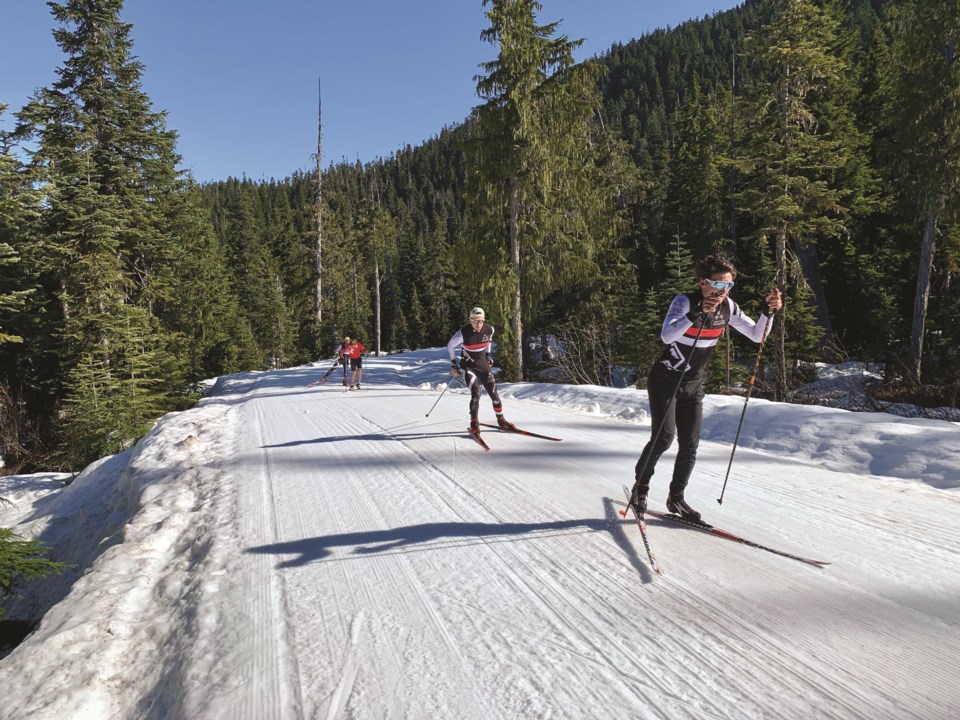Some of Canada’s top young biathletes have arrived at the Whistler Nordic Development Centre (WNDC) and are set to start their off-season training regimen ahead of the 2021-2022 season.
In the first five years of this program, 17 of 24 athletes have gone on to compete for the Canadian National team. When asked about that success, WNDC head coach Etienne Letondeur pointed to some of the unique advantages that training at the 2010 Olympic venue in the Callaghan Valley can offer that other places can’t.
“I think there’s a lot of different reasons for that [success], the first one is probably the quality of the program. It’s usually a big step forward in their pathway, compared to what they do at home. Not all the biathletes in the country have access to the Olympic facilities,” he said.
“And that’s a huge bonus for us. We’re training every day on world-class facilities so it’s pretty amazing. Also, we have access to snow a lot longer than some of our competitors and then we get back on snow earlier, usually like early November. That gives us a lot of time to practice and get better at the technique and the efficiency.”
However, according to Logan Pletz, one of the WNDC’s top athletes, a lot of the credit needs to also go to Letondeur himself and his focus on making them more well-rounded athletes.
“I really enjoy working with him because he gets straight to the point with whatever he wants to tell you, and it’s super effective in the training environment because you always know exactly what he thinks,” said Pletz.
“[Letondeur] definitely advocated for us to be complete athletes, so not just excelling in the sport of biathlon, but also helping us with our running technique, our gym technique when we’re working out, mountain biking or road biking and just sort of considering the skills required for all these different sports.
“And so because of that, as a group, we’ve been able to improve not only in the cross country skiing but also in a bunch of other physical areas as well.”
Pletz, who hails from Regina, Sask., is one of five athletes in the WNDC’s Podium Program, where the focus is on taking that next step and making the Canadian national team. The six other full-time athletes are in the Performance Program, which focuses on the technical things needed to become elite athletes.
With most of the athletes still too young to compete for spots on the 2022 Olympic team, Letondeur said the goal for this season is to get his team more international exposure at events like the World Junior Championships and ultimately take these athletes, who are at the top of the provincial level, and get them ready to make the national team.
But that doesn’t mean members of the Podium Program, like Pletz, don’t have their sights set on the Olympics in the future.
“I like to keep [the Olympics] in mind. For anybody on my team or anybody training at the level that we are, that’s just going to be the end goal. But I think that 2026 and 2030 would be more realistic expectations for me,” said Pletz.
“This coming season. I think that I’m definitely looking to qualify for the World Junior Championship again. There’s the World Cup races and then there’s what’s called the IBU circuit which is sort of feeder races that are the level under the World Cup. And I think that would be a challenging goal for me but definitely pretty realistic.”
However, these Olympic dreams don’t come without their fair share of outside challenges, too. One of the biggest struggles for biathletes is money, as the sport isn’t funded at the same level as some of the other Olympic sports. According to Pletz, the cost for each season can be upwards of $30,000, which can add the additional challenge of balancing work and training.
Going into his sixth year as the WNDC’s head coach, Letondeur is extremely impressed with the commitment level of his athletes, especially considering the burden those financial challenges can have on his young team.
“These athletes are all pretty young and some of them are coming from quite far [away],” he said.
“We have people from Ontario, Manitoba, Saskatchewan, and moving here is a big commitment. Like, time and money. So I’m pretty impressed by that because not everyone is that committed to their sport.”




